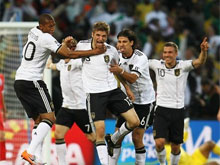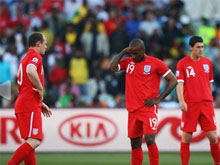England left South Africa in disgrace on Monday and while the coach Fabio Capello and senior player Frank Lampard try to deflect the blame for their 4-1 hammering by Germany in the last 16 of the World Cup, they are not fooling anybody, not least of all, their England fans.
The controversy over the Lampard 'goal' that was should not take away from what was a masterful German performance in utterly outplaying England in every department. Capello says that with the scoreline at 2-1, had the 'goal' been given, it would have changed the game.
Sorry, but it wouldn't. I firmly believe the Germans would have gone on to win the game in any case, they had too much quality across the park for an ageing and misfiring English. Had they not stopped playing in the final 15 minutes with the score at 4-1, the humiliation for England might have been even worse.
But the 'goal' does at least open up the debate about whether technology should be used in football.
Too expensive?
The problem with the introduction of goal-line technology from a FIFA point of view is that it would be an incredibly expensive thing to do, channelling money into an area when it could perhaps be better used for the development of the game in some of the poorer parts of the world.
Because if you have goal-line technology in place for a 2014 World Cup qualifier between England and Denmark at Wembley, in keeping the 'playing fields level', you need to also have it in place for the Oceania qualifiers between Vanuatu and Tuvalu, or the African qualifiers between the Comoros and São Tomé and Príncipe.
And what's more, FIFA president Sepp Blatter has said that if you change the laws of the game to include goal-line technology, then in order for Association Football to be played under the FIFA banner, this needs to be done at all levels, including the South African regional SAB League, our third division, and the practicality of that is near impossible.
More eyes on the ball
What FIFA are considering as an alternative is to add two extra match officials behind the goals to look out for these sorts of things. This was trialed in the 2009/10 UEFA Europa League campaign with some success, and it looks ever more likely that it will be introduced for the 2014 World Cup in Brazil.
Indeed, the International Football Association Board, the organisation that governs the laws of the game and is made up of FIFA, as well as the English, Scottish, Welsh and Northern Irish FA, voted 3-2 in favour of scrapping any more investigation into goal-line technology as recently as March this year.
England's FA and the Scottish FA voted in favour but Fifa, the Welsh and Northern Irish FAs were against it.
At the time Blatter said: "No matter which technology is applied, at the end of the day a decision will have to be taken by a human being. This being the case, why remove the responsibility from the referee to give it to someone else? It is often the case that, even after a slow-motion replay, 10 different experts will have 10 different opinions on what the decision should have been. Fans love to debate any given incident in a game. It is part of the human nature of our sport."
It is a debate that will continue to rage, but as with everything else, FIFA will get their way in the end.
Image sourced from www.fifa.com



































